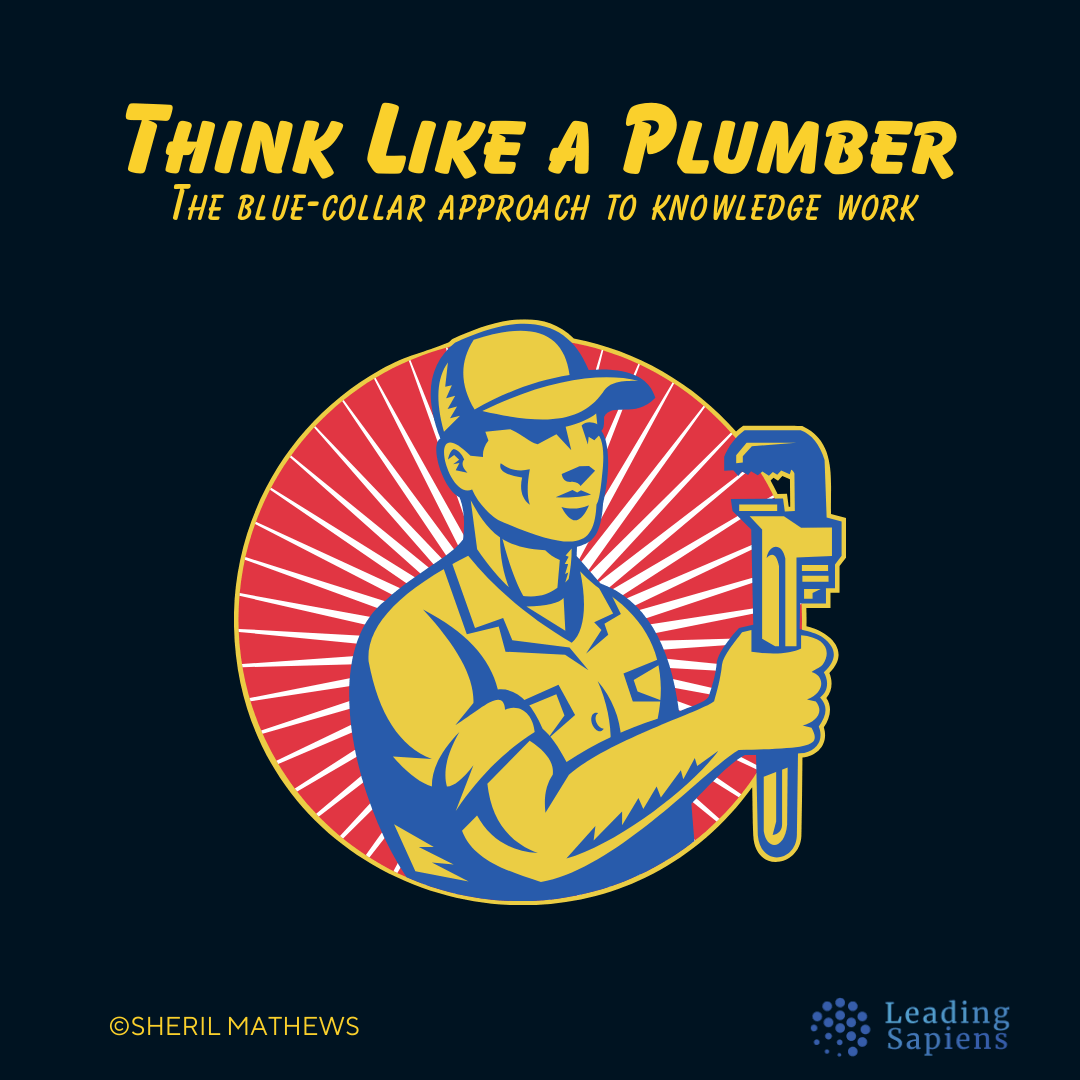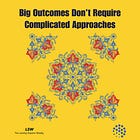The other day I caught myself saying, “I’m just not in the zone today”. I also stumbled on a book that promised to help me “think like a CEO”. Both these ideas sound intuitive but they mask a fundamental misunderstanding about the nature of knowledge work.
Whether you’re a programmer, consultant or CEO, knowledge work is often seen as demanding creativity, inspiration, and abstract strategic thinking. It's positioned as work that requires deep thought, and an environment free of routine and drudgery.
This glorification drives us to chase perfect conditions — the right ambiance, the ideal workspace, the perfect morning routine, a clear mind. Or we seek answers from so called experts. Don’t get me wrong. These are all great and do help a ton.
But they can also be distractions, subverting the very outcomes they intend to achieve.
Which is why it helps to balance “strategic thinking” with a "blue-collar mindset". Inspiration and genius come as much from messy but consistent engagement as it does from serene, detached contemplation.
Plumbers don't wait for inspiration; they show up and get to work. They understand that progress comes from consistent effort, not sporadic bursts of genius.
Treating intellectual work with the physical discipline, structure, and bone-headed persistence of blue collar labor unlocks not only productivity but also creativity. It mitigates cognitive fatigue, prevents paralysis by perfection, and builds incremental mastery.
Like the woodworker, the real power comes from the consistent act of showing up each day and “making a pile of chips”.
Hey! It’s Sheril Mathews from Leading Sapiens. Welcome to my newsletter, where I share strategies for getting savvier at leadership and work. Previous editions of this newsletter and pieces from my blog are at the bottom of this post.
The ever defiant muse
The idea of the muse dates back to ancient Greek mythology, where divine beings known as Muses were believed to inspire and guide creative and intellectual pursuits.
Today, we've replaced divine intervention with modern equivalents: the perfect coffee shop ambiance, the ideal productivity app, or the latest brain-enhancing supplement. We assume that breakthroughs only happen when we are "in the zone" or when feeling “inspired”.
Intellectual endeavors are framed as unpredictable and ethereal. Writers are expected to wait for the muse. Designers need the perfect mood. Leaders need to have a clear and expansive vision. Brainstorming teams need colorful sharpies and sticky notes.
Unfortunately, the muse is all too often inconsistent. The mood wavers. The vision is always muddled. And sharpies don’t guarantee breakthroughs.
The result? A fragile approach to knowledge work that breeds procrastination, imposter syndrome, and a crippling fear of starting because conditions are "not just right, yet."
Consider the contrasting approach of prolific authors like Stephen King or Isaac Asimov, who treated writing as a daily job rather than a mystical calling. Their consistency, not sporadic bursts of inspiration, led to their impressive bodies of work.
The blue-collar mindset is an under utilized template for dealing with the challenges of intellectual work. Instead of a lofty pursuit of greatness, it’s just another job that requires showing up every day, like a plumber or a truck driver.
The criteria becomes consistency of effort, not brilliance.
Consider the truck driver:
Clear objectives: Get from point A to B safely and efficiently.
Consistent effort: Drive the allocated hours, regardless of mood or inspiration.
Improvement: Refine routes, driving techniques, and vehicle maintenance over time.
Problem-solving: Navigate unexpected challenges (weather, traffic, mechanical issues) pragmatically.
There is no expectation of “innovation” at every turn, no demand for brilliance in each mile. It's just driving — consistently, diligently, day after day.
And that, paradoxically, leads to mastery in the intellectual domain as well. By showing up consistently and tackling problems systematically, we create the conditions for insights and breakthroughs to emerge organically.
The power of structure
One of the challenges of knowledge work is the lack of clear start and finish lines. Unlike a factory shift or a construction project, knowledge work has no defined end, no clear moment when you can definitively say "it’s done." Work typically begets more work in a never-ending cycle.
This ambiguity creates challenges:
Scope creep: Projects expand indefinitely without clear boundaries.
Perfectionism: The absence of a clear "done" state leads to endless tweaking.
Burnout: Without natural stopping points, it’s easy to push ourselves too far and too long.
Difficulty in measuring progress: Unlike laying bricks or cranking widgets, progress is intangible.
This ambiguity is mentally draining, leading to decision fatigue — where the quality of decisions deteriorates due to the cognitive load of constant choice-making. Studies also show that willpower is a finite resource that depletes throughout the day.
By adopting a blue-collar mindset, we introduce the structure that knowledge work desperately needs. It aligns with research on habit formation and productivity:
Implementation intentions: Pre-deciding when, where, and how you'll perform tasks.
Routinization: Establishing fixed work hours and rituals, mimicking the shift structure of manual labor.
Batching: Grouping similar tasks together to reduce context switching, a technique used in manufacturing to improve efficiency.
Clear deliverables: Breaking work into tangible outputs, even if they're intermediate steps.
Instead of waiting for inspiration, you commit to showing up at your desk every day, just as a trucker reports to a job site.
This kind of self-imposed external structure on otherwise ill-defined work has several benefits:
Reduced decision fatigue: By pre-committing to work sessions, you eliminate the daily internal debate about whether and what to engage in.
Increased consistency: Regular "shifts" build momentum and compound progress over time, similar to how consistent physical exercise leads to fitness gains.
Detachment from outcomes: Viewing work as a routine task rather than a reflection of self-worth reduces performance anxiety and enhances creativity.
Inside the structure, productivity and creativity become by-products rather than the goal in itself. The work becomes something that simply needs doing — not a statement of our identity or a referendum on our creative worth.
It’s simply a “shift” you show up for, rain or shine.
Valuing the mundane
We glamorize achievements and great works of art, celebrating the finished product while ignoring the years of labor that went into it. We set a trap for ourselves by idolizing the outcome and dismissing the process.
The blue collar mindset of "making a pile of chips," challenges this glorification. It asks us to value output over outcome, effort over elegance, and quantity over perfection.
Consider a study involving ceramics students who were divided into two groups. One group was instructed to produce one perfect pot, while the other was told to produce as many pots as possible. Interestingly, the group focused on quantity ended up making better-quality pots.
Creativity and skill emerge not from the pressure to make something perfect, but from the simple act of doing — repeatedly, in spite of suboptimal results at first.
Not every piece will be great, and that’s okay. The important thing is to produce something, trusting that the act of doing is the game.
Think like a plumber, not a CEO.
Related reading
Despite years of practicing and coaching this, I regularly fall for the allure of “inspired work”. Of course, as is often the case, the initially uninspired work eventually leads to inspiration!
Here are some related pieces from my blog that touch on similar aspects:
Self-doubt and imposter syndrome are not necessarily a problem
Creativity (and leadership) is a decision first, skill second
Previous newsletter editions
That does it for this week. Have a great weekend!








Indeed, Sheril, successful knowledge work is similar to the practices of trades and crafts, emphasizing discipline, consistency, and fine-tuning. Your instruction on how to realize the power of structure, "self-imposed external structure on otherwise ill-defined work," is invaluable. Thank you for the excellent newsletter.